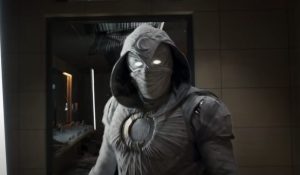‘Moon Knight’ Episode Two is Yet Another Disappointment
Disney
Marvel’s episode two of “Moon Knight” did not clear up any more confusion from the premier, and had multiple ups and downs that only made it worse.
April 27, 2022
This column was written by Alex Gribb and will be an ongoing story about Marvel’s Moon Knight series.
Episode two of “Moon Knight” simultaneously raised and lowered my expectations, creating an emotion more confusing than the plot itself.
In this episode, Steven Grant faces ramifications for the bathroom incident featured in the last episode and is fired. The two personalities (Mark Spector and Steven Grant) have conversations, where Spector constantly asks Grant to “let” him take over. Grant ignores this request and goes to the storage facility with the key he found in his apartment. There, he finds passports, guns, fake IDs, and a military-style cot.
Being ridiculously confused, Grant begins to freak out and is then consoled by Spector as the storage container has walls made out of mirrors. Running out of room with the duffle bag, the lights begin to flicker, and Grant sees the Egyptian moon god Khonshu begin to chase him. He catches a ride home with a woman named Layla, who claims to be his wife.
After the pair return to Grant’s apartment, two people appearing to be police officers inspect the bag, while Layla escapes out the window. Grant is then driven to the commune of the cult leader, Arthur Harrow, and it is discovered that the two police officers were really working for Harrow.
Harrow asks for the scarab once again, which is actually a compass to the tomb of the Egyptian Goddess of Judgment, Ammit, who Harrow is an avatar for. An avatar in this universe is someone who has the powers of a god, when said god allows it. Another fight scene ensues, but this time, Grant is in control. Grant loses the scarab in the fight, and he is chased by another dog-like creature, which is why Grant ultimately “allows” Spector to take over. The Moon God catches up with Spector and transports him to Egypt. We also learn that if Spector dies, Spector’s wife would become the next avatar of the moon god, revealing the motivation behind the entire struggle. We are not totally clear on what being an avatar wholly means, but someone who is one typically has no free will, and does anything their god asks them to.
I think trying to summarize these episodes is making me bitter about the plot, because trying to find nine different synonyms for “confusing” is becoming an issue.
This episode was far more improved than the last, as some loose ends were explained. Although awfully portrayed, the split personality plotline is beginning to make more sense, with the motives behind his character becoming more developed.
I would be lying if I didn’t think that Steven Grant was funny. At some point, I did audibly laugh at one of his lines, which rarely happens with Marvel content. Layla is also enjoyable to listen to, but her character feels only there to support Marc’s sacrifice arch. I think that mentioning Layla as a character would have had the same effect, as she does not appear awfully important so far.
Marvel movies and TV shows rely on their characters, not their plots. The four Avengers movies have storylines involving: an elf, a robot, and a genocidal Barney lookalike. Safe to say the only thing keeping Disney afloat right now is the characters themselves, not the plots they are forced into.
What was important, however, was the lighting in this episode. The happiness I felt watching the chase scene with the moon god in the storage unit (I can not believe that is a sentence I just wrote)was undeniable. It was honestly cool to see the lights flickering, illuminating the dangerous figure coming closer. The suspense developed was appreciated.
What was not appreciated was yet again, the inaccuracies surrounding DID. I am aware that this issue will occur across the entire series, but I feel it would be a falsity to sugarcoat the damage Marvel is doing in their incorrect portrayal.
In an interview with Vanity Fair, Oscar Issac who plays Marc Spector and Steven Grant explains why “Moon Knight” is disconnected from the Marvel Cinematic Universe (MCU), and is a standalone production. Isaac says, “We wanted everything to feel like it was an external expression of an internal struggle. And so the plot ties to other MCU things became much less important because the most important thing was an emotional truth to the journey that was happening.”
What emotional truth consolidates lies about a real mental illness. What inaccuracies of DID constitute an external expression of an internal struggle? No one with DID has a choice in when and if they switch, and the lack of realism in having an Egyptian God tied to one altar isn’t an external expression. It’s exploiting the struggle of those with DID for a plotline that is more confusing than it is good.
All things considered, I am slowly losing interest in this series, as its problematic plot and underdeveloped characters make the entire viewing experience much less enticing.






















